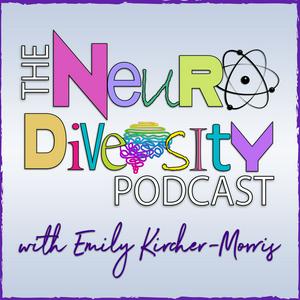This week, Emily sits down with advisory teacher Rebecca Duffus, and neurodiversity advocate Lyric Rivera, to discuss the critical shift from viewing autism as a purely medical diagnosis to embracing it as a core identity. Lyric shares their personal journey of late discovery and the complex emotions that accompany it, from grief to validation. Rebecca provides some insight into the importance of authentic, affirming language. They also discuss how to empower autistic youth to advocate for their needs, navigate a world that isn't always accommodating, and ultimately discover the power of being exactly who they are. Rebecca and Lyric are co-authors of Autism, Identity and Me.
TAKEAWAYS
Identity vs pathology is all about framing autism as a core identity, rather than strictly a medical diagnosis or a list of deficits.
Late-diagnosis autism often results in a complex cocktail of emotions, including grief, anger, and eventually relief.
There is a crucial difference between forcing an upbeat perspective, and using language that genuinely validates an autistic person's lived experience.
Equipping, not just protecting, will help autistic kids understand neurodiversity, handle misunderstandings, and utilize an autism identity statement for self-advocacy.
There is a shifting landscape of autism support, language, and systemic challenges in the US, especially compared to the UK.
Mental health professionals, join us for our next live 90-minute CE training, Inherited Neurodivergence: Supporting Parents' Identity Journeys, featuring presenter, Dr. Amy Marschall. The event is Friday, March 6 at 2:00 pm Eastern/11:00 am Pacific. It's approved for continuing education through the American Psychological Association and the National Board of Certified Counselors. If you can't make it live, you can still register for the self-study version.
Rebecca Duffus, BSc, PGCE, MA, is an experienced Advisory Teacher with a background in psychology and a master's in Autism and Education. Based in the UK, she has worked across mainstream and specialist education settings, as well as with local councils, charities, and educational services to support autistic students and the professionals who serve them.
Rebecca is the author of Autism, Identity & Me, a workbook and guidebook set published by Routledge in both the U.S. and the UK. She regularly speaks at conferences, develops parent programmes, and provides training and coaching for educators and schools. Her work centers on supporting identity-affirming practices and building inclusive, informed environments for neurodivergent learners.
Lyric Rivera is the founder of NeuroDivergent Consulting and the author of the best-selling business ethics book Workplace Neurodiversity Rising, praised by Forbes as "an excellent 'how-to manual' based on lived experience and professional competence," and named a "Trend for 2023." A prominent voice in the neurodiversity movement, Lyric is also the creator of the popular blog NeuroDivergent Rebel and the originator of the #AskingAutistics hashtag, which has sparked wide-reaching conversations about the Autistic experience.
Through their writing, consulting, and online advocacy, Lyric helps organizations and individuals build more inclusive, neurodiversity-affirming environments. Their work fosters connection and understanding across communities and empowers neurodivergent people to be heard, supported, and celebrated.
BACKGROUND READING
Rebecca: Website, Instagram, Facebook, LinkedIn
Lyric: Website, Facebook, Instagram, Threads, Blue Sky, Substack
The Neurodiversity Podcast is on Facebook, Instagram, BlueSky, and you're invited to join our Facebook Group. For more information go to www.NeurodiversityPodcast.com.
If you'd like members of your organization, school district, or company to know more about the subjects discussed on our podcast, Emily Kircher-Morris provides keynote addresses, workshops, and training sessions worldwide, in-person or virtually. You can choose from a list of established presentations, or work with Emily to develop a custom talk to fit your unique situation. To learn more, visit our website.


